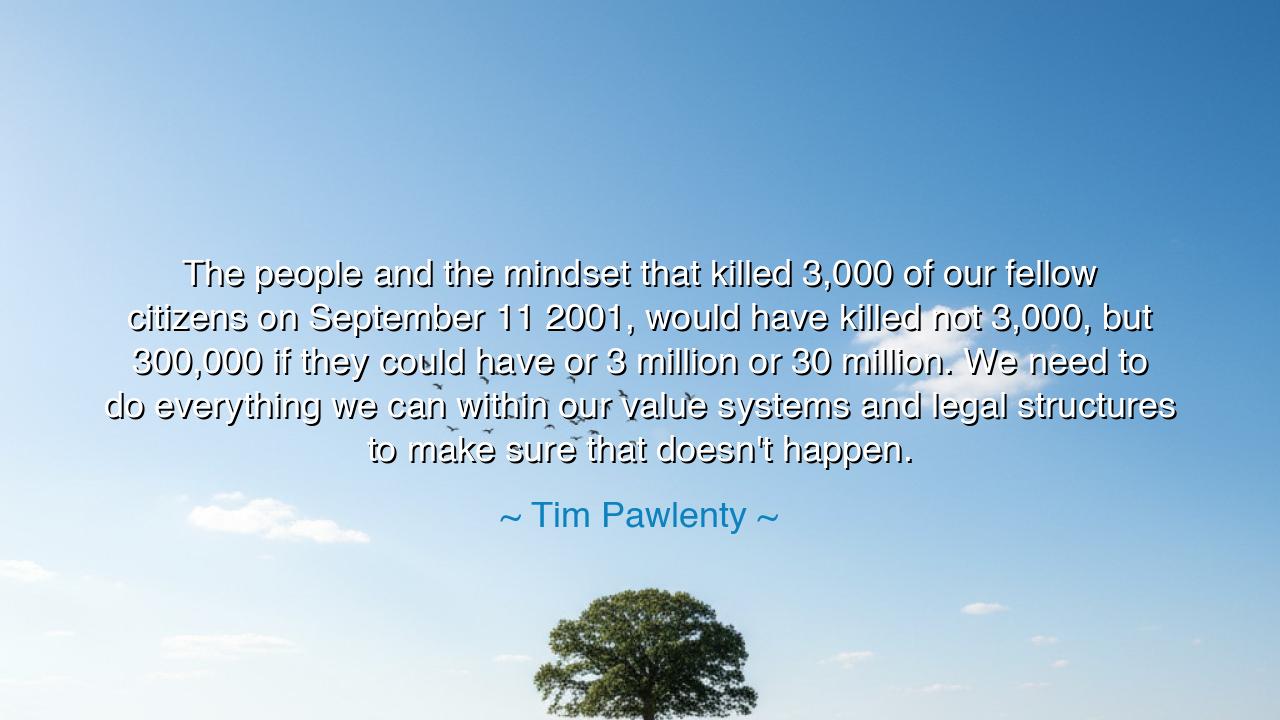
The people and the mindset that killed 3,000 of our fellow
The people and the mindset that killed 3,000 of our fellow citizens on September 11 2001, would have killed not 3,000, but 300,000 if they could have or 3 million or 30 million. We need to do everything we can within our value systems and legal structures to make sure that doesn't happen.






There are times in history when evil reveals itself not through armies or banners, but through the cold intent of destruction, when hatred burns so fiercely that it seeks to extinguish all light. In such a time spoke Tim Pawlenty, reflecting on the terror of September 11, 2001, when nearly three thousand souls were lost to the flames and rubble of a single morning. His words—“The people and the mindset that killed 3,000 of our fellow citizens… would have killed not 3,000, but 300,000 if they could have or 3 million or 30 million. We need to do everything we can within our value systems and legal structures to make sure that doesn’t happen.”—are not merely a call to vigilance, but a reminder of the fragility of civilization, and the sacred duty to defend it without losing the soul that makes it worth defending.
The origin of the quote lies in the aftermath of terror, when the world trembled before an unseen enemy—a mindset, as Pawlenty wisely calls it, born not of a nation but of hatred. This hatred knew no borders, no mercy, no restraint. It was a shadow that sought to consume innocence itself. Pawlenty’s words do not merely recall the tragedy of that day; they unveil the eternal truth that evil, when left unchecked, has no limit. It is not content with the ruin of a few—it seeks the ruin of all. His warning, therefore, is both historical and moral: that the defense of freedom must be as fierce as the attack upon it, but never so unrestrained that it destroys the very values and laws that distinguish us from those who hate.
In the ancient world, after the fall of Athens to Sparta, the philosopher Plato reflected upon how fear and vengeance can transform a just city into its own oppressor. Pawlenty’s invocation of “our value systems and legal structures” echoes that wisdom across millennia. For the struggle against terror is not merely fought on battlefields—it is fought within hearts, courts, and councils. To preserve safety by abandoning justice is to win the battle and lose the war for our humanity. Thus, Pawlenty’s words are not only a cry for strength but for restraint, reminding future generations that true victory lies in righteousness tempered by wisdom.
Yet, his statement is also a recognition of the magnitude of the threat. The men who killed three thousand would have killed millions if fate had allowed. This is not hyperbole, but truth. It is the nature of fanaticism—blind to mercy, deaf to reason, intoxicated by destruction. Just as the Mongol hordes swept through cities, leveling civilizations in the name of power, so too would modern terror consume entire peoples for its creed. Pawlenty’s wisdom lies in naming the mindset itself as the enemy—not a race, not a religion, but an ideology that worships death. To confront such darkness, a nation must wield both strength and moral clarity, for without the latter, strength becomes tyranny.
History offers us countless mirrors. After the Second World War, when the world witnessed the full horror of what hatred can accomplish, the victors faced a grave question: how to bring justice without becoming the very monsters they defeated. The Nuremberg Trials became the answer—a triumph not of revenge, but of law. Humanity proved that even in the face of unimaginable evil, justice could still wear the robe of civility. Pawlenty’s call to act “within our value systems and legal structures” follows this same path—it demands that we confront terror with power guided by principle, so that in defending the innocent, we do not lose our own innocence.
But these words also bear the weight of sorrow. For the memory of 9/11 is not a wound easily healed. It lives in the silence of those who never came home, in the tears of children who grew up without fathers, in the echo of a skyline forever changed. To say that we must “do everything we can” is not a cry of anger, but of responsibility. It is the vow of the living to the dead: that their sacrifice will not be in vain, and that the freedom they cherished will be guarded with courage, compassion, and law. It is a call to vigilance not rooted in hatred, but in love—for one’s country, one’s neighbor, and the sacredness of life itself.
The lesson, then, is one of balance and eternal duty. Let every generation remember: there will always be forces that seek to destroy what is good. To confront them, we must be unyielding in defense, but unwavering in virtue. Our strength must never eclipse our conscience, for if we abandon justice in pursuit of safety, we become the architects of our own ruin. The wise must build shields not only of steel, but of ethics, for it is righteousness that gives defense its meaning. Protect, but do not persecute. Guard, but do not govern through fear.
Thus, from the voice of Tim Pawlenty emerges a timeless teaching: the war against evil is not won by force alone, but by the steadfast preservation of our moral soul. Every citizen, every leader, every heart must stand guard against both the terror that comes from without and the corruption that can arise within. For when we act with courage and conscience, we prove that humanity can face darkness—and remain light.






AAdministratorAdministrator
Welcome, honored guests. Please leave a comment, we will respond soon